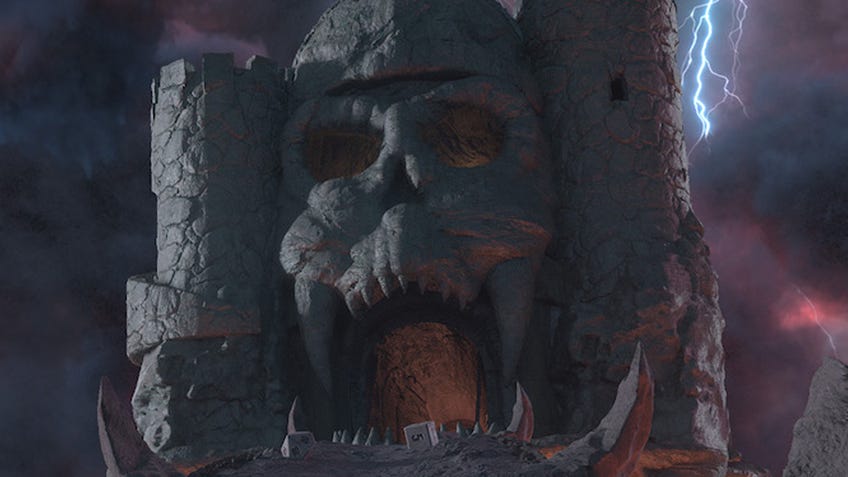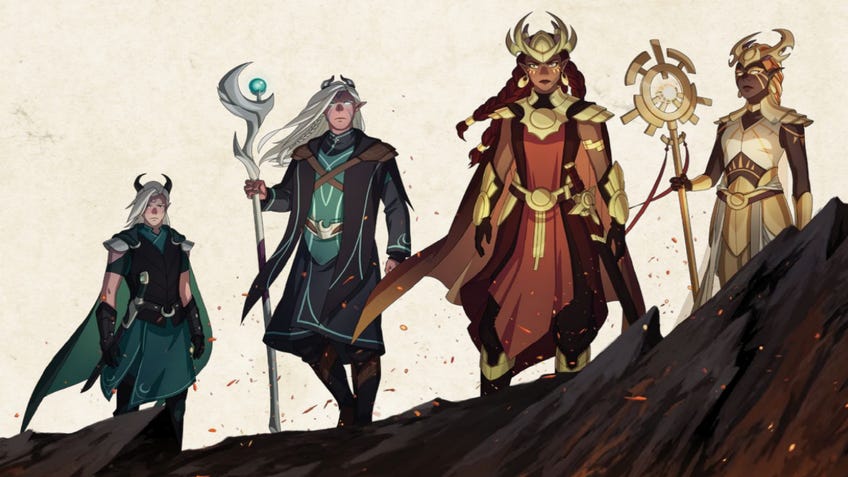‘What pain do we want to experience?’: Fandom Tabletop address community license backlash
Bart Vickers reflects on what went wrong and how the second iteration aims for clearer communication and more transparency.
The members of Fandom Tabletop and the Cortex Prime design team seemed to expect the announcement of two new community-focused licenses to be received with excitement. But the November 30th update to the genre-agnostic system’s Kickstarter instead prompted an outpouring of criticism and dismay.
At worst, players interpreted the community license as a crass method of legally stealing community creations. The company working on Tales of Xadia: The Dragon Prince RPG and Legends of Grayskull: The Masters of the Universe RPG was quick to explain that this initial version simply did not accurately convey its intentions and promised to return to the legal drawing board.
Dicebreaker sat down with Fandom Tabletop’s Marketing Lead Bart Vickers at PAX Unplugged 2021 to discuss the shape of those revisions, when players might expect an update and what those poorly conveyed intentions really were.
You joined Fandom about a year after they acquired the rights to the Cortex system and Cam Banks. What has been your role in that increased tabletop push?
Bart Vickers: They’ve already got a great relationship, as well as a platform and D&D Beyond. How do we continue to grow that are a little bit more specific and custom. How do we help people celebrate little-f fandoms through gameplay? That’s where the Fandom Tabletop side of things bubbled up. We had a great out-of-the-gate relationship with Wonderstorm and The Dragon Prince - really passionate fan base, there. Being able to create something that is part of the work so that people can celebrate that fandom rather than just licensing the IP and making a game out of it.
It’s interesting that Fandom decided to go with Cortex Prime, given the company's investment in D&D Beyond. Why not double down on 5E to power licensed games?
It’ll probably be a little unpopular to admit things aren’t the way you want them in version 1.0, but we’re going to continue to listen and support.
I think we had a really great convergence of opportunities. One was a great relationship with Cam Banks, the designer of the Cortex system, as well as Fandom becoming better and better over time about understanding the space and what tabletop gaming means. Let's have the most flexible platform possible to use gaming as a way to celebrate fandom. The D20 systems are great, but what we've got on the Cortex side is something much more narrative, much more collaborative, much more storytelling based. Also, it's really, really flexible. Those are two sides of the business that operate independently.
Licensed games tend to have a reputation as quick cash grabs, akin to movie tie-in video games. How is Fandom Tabletop approaching Tales of Xadia, Masters of the Universe, etc. in order to avoid that feeling?
It's huge. Part of it is like, ‘What pain do we want to experience?’ We’d prefer the pain of really crafting something great and partnering with the IP creators themselves to do something authentic, genuine and that grows and extends that IP. The painful part of that is, we’re working with writers and artists and making sure that what we’re doing on the gaming side is tying into what they’re doing - writing the next season of the series. That means our timelines are slower. It’s a lot more back and forth. It’s a lot more partnering.
For example, players and fans of The Dragon Prince are going to see things in Tales of Xadia that have never been shown before in that universe but are canon. That’s really what we want to do. We see when IPs don’t fare well, and that’s because there’s not intentional hard work to make it part of the larger story.

Do you feel as though Fandom Tabletop has a handle on how to produce these licensed RPGs, yet? One that works best for the creators, the players and the IP holders?
Part of me is never going to feel that way. I’m always the person that asks how we do this better. How do we really fine-tune everything? But we will likely have this operational rhythm established by the time we’ve done maybe three to five games. The vision is that once you get the Cortex System, playgroups can get super deep into certain worlds or sample a little bit of everything, buffet style. We want to make sure both approaches are available.
Coming from a traditional RPG background, how do you feel about the company putting a lot of stake in the digital tools? Do you believe they will be polished enough to entice other old-schoolers like yourself?
I will admit that up until probably 2018 I was that pen-and-paper player, one who needed physical dice. I need to touch the books. I had tried D&D Beyond - the Player’s Handbook and Xanathar’s Guide to Everything were my very first digital purchases. And while the experience wasn’t perfect, it was a game changer. If we can help people spend more time hanging out, socialising and really enjoying the game, rather than flipping through a few thousand pages of rules - that’s great.
How do we help people celebrate little-f fandoms through gameplay? That’s where the Fandom Tabletop side of things bubbled up.
Tabletop games should be for everyone, and digital tools - if we do them right - lower that barrier to entry. If someone is hesitant about branching out from D&D or coming from The Dragon Prince without any tabletop knowledge, those tools should help.
I want to talk about the community licences. Why did Fandom Tabletop decide that now was the time to announce them in the manner you did?
This was the frustrating thing - we spent a lot of time internally talking about what we wanted the licences to communicate to our community. Right at the core of it were two things that shouldn’t be competitive. One is, if you want to call the thing that you’re creating a Cortex game, there are certain things that you need to do in order to protect the Cortex brand. The other side of that was our desire to put a stake in the ground saying that the community is very intentionally sharing things.
So, if I create something with a community licence - I make a new mechanic for my game, for example - we wanted to have a very clear statement that says, ‘Hey, that’s going to be available to the whole community to use, as well.’ And we felt like we had hit the balance point between those two things. Obviously, There were some things lost in translation. The community had a lot of feedback - ‘What about this or that’ or ‘Can you really claim ownership of these things?’
As we heard that feedback, it was a great point for us to step back and realise this wasn’t as clear as it needed to be. This isn’t communicating the intent of community sharing, while protecting the core Cortex brand. So, yeah. We’re in the process of doing those revisions literally right now.
How did that mistranslation happen in the first place? What went wrong, in your opinion?
We spent a lot of time internally talking about what we wanted the licences to communicate to our community.
I’m one of those people that will always say the buck stops here. If I had a time machine, I would go back and spend a lot more time with my user hat on for a second. What are the ways I might look at this and have concerns? It was a great lesson learned for me that since we’re a community-oriented game we should make sure we’re putting that hat on. I’m looking forward to the next generation of [the community licence]. It should be coming soon.
Did you look at existing community licences as models or comparisons while drafting your own?
I wouldn't necessarily say comparisons. It was always really important for us to understand what's out there and the approaches that other publishers are taking, but I wouldn't say that there was an intent to model or pick and choose [among existing licences]. Really it was more about what it is that we want to accomplish with the community and kind of starting there.

Many designers use community licences and open creative licences as ways to start their careers - some with dreams of landing at Wizards of the Coast or other dream jobs. Is that something you want to foster?
Oh, 100%. We talked earlier about what those tentpole licensed IPs might look like. On the Cortex side, I think it's very possible that, through either the community licence or some variant of the commercial licence, we may actually see the most popular and successful games bubble up from the community. We really want to make sure we’re encouraging that. Right now, we’re in kind of a strange spot. If you want to make something from a community perspective, here’s the licence for that - imperfect as it may be. If you want to Kickstarter your thing or sell it through whatever publishing channels, we have commercial mechanisms for opportunity.
Part of it is like, ‘What pain do we want to experience?’ We’d prefer the pain of really crafting something great.
What’s on the roadmap, which will really unlock that path, is a community marketplace. It’s in the middle of the two established extremes where someone can create, share and make some money off of it, while also getting feedback from the community. And we, as Fandom Tabletop and Cortex, can shine a spotlight on it, encouraging that creation. The problem is that it takes technical infrastructure that’s on the roadmap. We’re just not there, yet.
The Kickstarter update about these licences admitted that the marketplace would have filled in some necessary context. Do you feel as though its lack was another misstep?
I don’t know if I would necessarily call it a misstep. I do think it’s one of those things that absolutely contributed to that tension within the community. We basically had to make a decision - and it was a tough one - to hold off on releasing a community licence until that marketplace infrastructure is done - and we're working on it - or reach out to the community and say, ‘start your engines.’
Are you reconsidering aspects of the marketplace in light of the public criticism of the licences?
I think it’s really about making sure that we’ve been rigorous with that community hat before we turn the lights on in the marketplace. Our designers and product developers do a really good job of that. We just have to make sure we’re carrying it through all the way to the end. Make sure people know how they will earn money off of it and the ways they can use it to hype up their creations.
There will be times we may not be able to do everything users would like to do, and we want to be able to call those out very clearly. It’ll probably be a little unpopular to admit things aren’t the way you want them in version 1.0, but we’re going to continue to listen and support. We’ll never say this thing is done.




